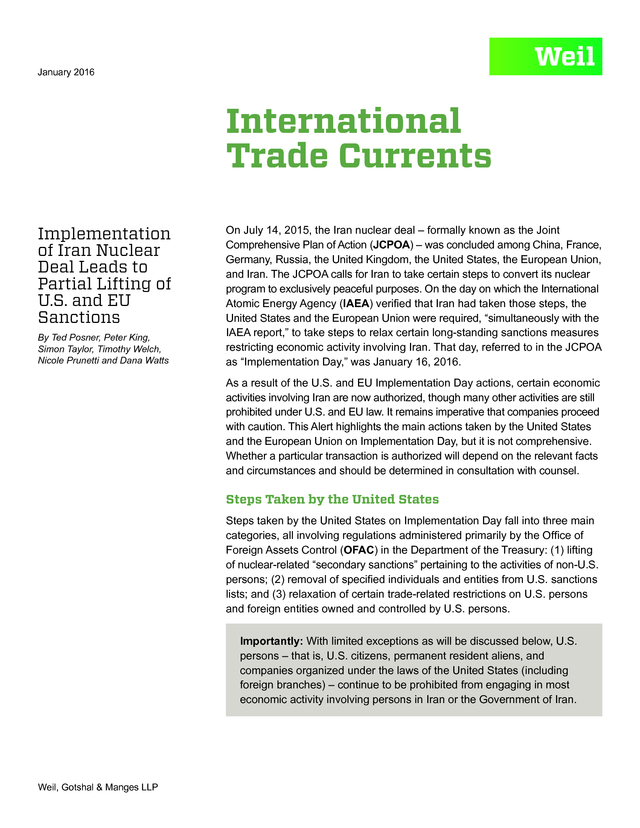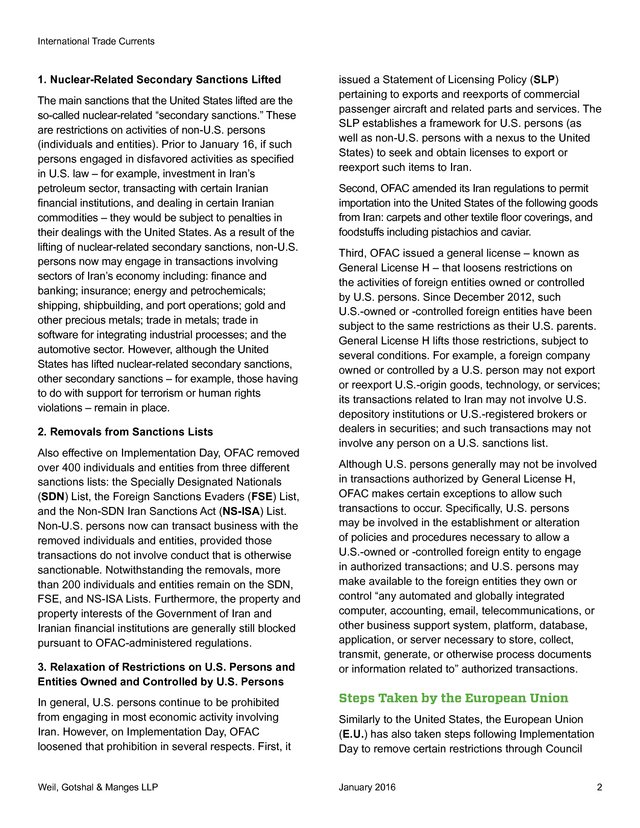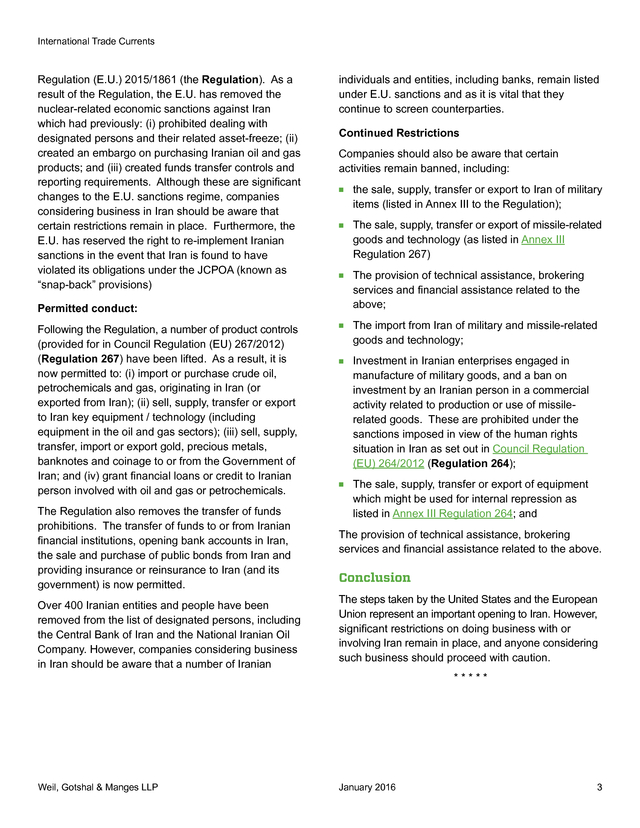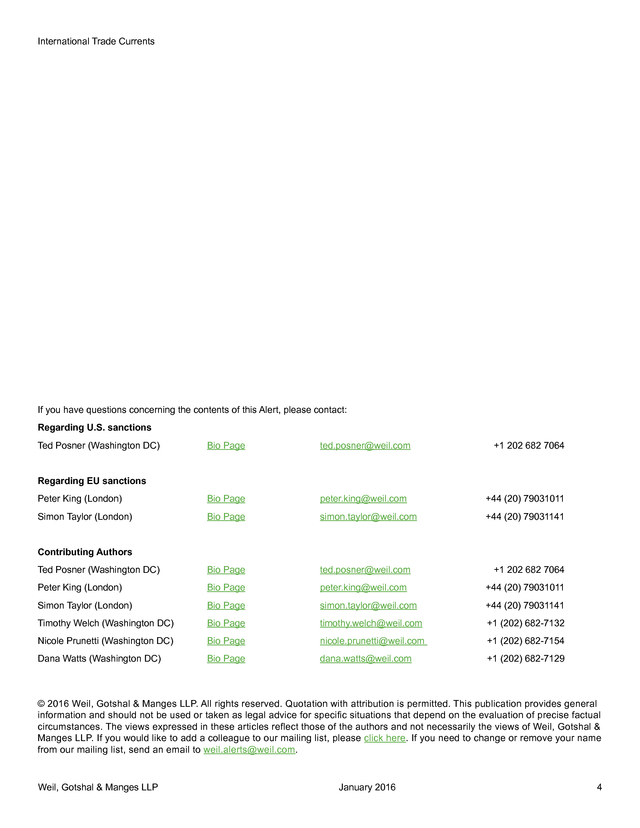Implementation of Iran Nuclear Deal Leads to Partial Lifting of U.S. and EU Sanctions - January 2016
Weil, Gotshal & Manges
Description
January 2016
International
Trade Currents
Implementation
of Iran Nuclear
Deal Leads to
Partial Lifting of
U.S. and EU
Sanctions
By Ted Posner, Peter King,
Simon Taylor, Timothy Welch,
Nicole Prunetti and Dana Watts
On July 14, 2015, the Iran nuclear deal – formally known as the Joint
Comprehensive Plan of Action (JCPOA) – was concluded among China, France,
Germany, Russia, the United Kingdom, the United States, the European Union,
and Iran. The JCPOA calls for Iran to take certain steps to convert its nuclear
program to exclusively peaceful purposes. On the day on which the International
Atomic Energy Agency (IAEA) verified that Iran had taken those steps, the
United States and the European Union were required, “simultaneously with the
IAEA report,” to take steps to relax certain long-standing sanctions measures
restricting economic activity involving Iran.
That day, referred to in the JCPOA as “Implementation Day,” was January 16, 2016. As a result of the U.S. and EU Implementation Day actions, certain economic activities involving Iran are now authorized, though many other activities are still prohibited under U.S. and EU law.
It remains imperative that companies proceed with caution. This Alert highlights the main actions taken by the United States and the European Union on Implementation Day, but it is not comprehensive. Whether a particular transaction is authorized will depend on the relevant facts and circumstances and should be determined in consultation with counsel. Steps Taken by the United States Steps taken by the United States on Implementation Day fall into three main categories, all involving regulations administered primarily by the Office of Foreign Assets Control (OFAC) in the Department of the Treasury: (1) lifting of nuclear-related “secondary sanctions” pertaining to the activities of non-U.S. persons; (2) removal of specified individuals and entities from U.S. sanctions lists; and (3) relaxation of certain trade-related restrictions on U.S.
persons and foreign entities owned and controlled by U.S. persons. Importantly: With limited exceptions as will be discussed below, U.S. persons – that is, U.S. citizens, permanent resident aliens, and companies organized under the laws of the United States (including foreign branches) – continue to be prohibited from engaging in most economic activity involving persons in Iran or the Government of Iran. Weil, Gotshal & Manges LLP .
International Trade Currents 1. Nuclear-Related Secondary Sanctions Lifted The main sanctions that the United States lifted are the so-called nuclear-related “secondary sanctions.” These are restrictions on activities of non-U.S. persons (individuals and entities). Prior to January 16, if such persons engaged in disfavored activities as specified in U.S.
law – for example, investment in Iran’s petroleum sector, transacting with certain Iranian financial institutions, and dealing in certain Iranian commodities – they would be subject to penalties in their dealings with the United States. As a result of the lifting of nuclear-related secondary sanctions, non-U.S. persons now may engage in transactions involving sectors of Iran’s economy including: finance and banking; insurance; energy and petrochemicals; shipping, shipbuilding, and port operations; gold and other precious metals; trade in metals; trade in software for integrating industrial processes; and the automotive sector. However, although the United States has lifted nuclear-related secondary sanctions, other secondary sanctions – for example, those having to do with support for terrorism or human rights violations – remain in place. 2.
Removals from Sanctions Lists Also effective on Implementation Day, OFAC removed over 400 individuals and entities from three different sanctions lists: the Specially Designated Nationals (SDN) List, the Foreign Sanctions Evaders (FSE) List, and the Non-SDN Iran Sanctions Act (NS-ISA) List. Non-U.S. persons now can transact business with the removed individuals and entities, provided those transactions do not involve conduct that is otherwise sanctionable. Notwithstanding the removals, more than 200 individuals and entities remain on the SDN, FSE, and NS-ISA Lists.
Furthermore, the property and property interests of the Government of Iran and Iranian financial institutions are generally still blocked pursuant to OFAC-administered regulations. 3. Relaxation of Restrictions on U.S. Persons and Entities Owned and Controlled by U.S.
Persons In general, U.S. persons continue to be prohibited from engaging in most economic activity involving Iran. However, on Implementation Day, OFAC loosened that prohibition in several respects.
First, it Weil, Gotshal & Manges LLP issued a Statement of Licensing Policy (SLP) pertaining to exports and reexports of commercial passenger aircraft and related parts and services. The SLP establishes a framework for U.S. persons (as well as non-U.S.
persons with a nexus to the United States) to seek and obtain licenses to export or reexport such items to Iran. Second, OFAC amended its Iran regulations to permit importation into the United States of the following goods from Iran: carpets and other textile floor coverings, and foodstuffs including pistachios and caviar. Third, OFAC issued a general license – known as General License H – that loosens restrictions on the activities of foreign entities owned or controlled by U.S. persons. Since December 2012, such U.S.-owned or -controlled foreign entities have been subject to the same restrictions as their U.S.
parents. General License H lifts those restrictions, subject to several conditions. For example, a foreign company owned or controlled by a U.S. person may not export or reexport U.S.-origin goods, technology, or services; its transactions related to Iran may not involve U.S. depository institutions or U.S.-registered brokers or dealers in securities; and such transactions may not involve any person on a U.S.
sanctions list. Although U.S. persons generally may not be involved in transactions authorized by General License H, OFAC makes certain exceptions to allow such transactions to occur. Specifically, U.S.
persons may be involved in the establishment or alteration of policies and procedures necessary to allow a U.S.-owned or -controlled foreign entity to engage in authorized transactions; and U.S. persons may make available to the foreign entities they own or control “any automated and globally integrated computer, accounting, email, telecommunications, or other business support system, platform, database, application, or server necessary to store, collect, transmit, generate, or otherwise process documents or information related to” authorized transactions. Steps Taken by the European Union Similarly to the United States, the European Union (E.U.) has also taken steps following Implementation Day to remove certain restrictions through Council January 2016 2 . International Trade Currents Regulation (E.U.) 2015/1861 (the Regulation). As a result of the Regulation, the E.U. has removed the nuclear-related economic sanctions against Iran which had previously: (i) prohibited dealing with designated persons and their related asset-freeze; (ii) created an embargo on purchasing Iranian oil and gas products; and (iii) created funds transfer controls and reporting requirements. Although these are significant changes to the E.U.
sanctions regime, companies considering business in Iran should be aware that certain restrictions remain in place. Furthermore, the E.U. has reserved the right to re-implement Iranian sanctions in the event that Iran is found to have violated its obligations under the JCPOA (known as “snap-back” provisions) individuals and entities, including banks, remain listed under E.U.
sanctions and as it is vital that they continue to screen counterparties. Continued Restrictions Companies should also be aware that certain activities remain banned, including: â– â– â– â– â– â– Permitted conduct: Following the Regulation, a number of product controls (provided for in Council Regulation (EU) 267/2012) (Regulation 267) have been lifted. As a result, it is now permitted to: (i) import or purchase crude oil, petrochemicals and gas, originating in Iran (or exported from Iran); (ii) sell, supply, transfer or export to Iran key equipment / technology (including equipment in the oil and gas sectors); (iii) sell, supply, transfer, import or export gold, precious metals, banknotes and coinage to or from the Government of Iran; and (iv) grant financial loans or credit to Iranian person involved with oil and gas or petrochemicals. The Regulation also removes the transfer of funds prohibitions. The transfer of funds to or from Iranian financial institutions, opening bank accounts in Iran, the sale and purchase of public bonds from Iran and providing insurance or reinsurance to Iran (and its government) is now permitted. Over 400 Iranian entities and people have been removed from the list of designated persons, including the Central Bank of Iran and the National Iranian Oil Company.
However, companies considering business in Iran should be aware that a number of Iranian Weil, Gotshal & Manges LLP â– â– â– â– â– â– the sale, supply, transfer or export to Iran of military items (listed in Annex III to the Regulation); The sale, supply, transfer or export of missile-related goods and technology (as listed in Annex III Regulation 267) The provision of technical assistance, brokering services and financial assistance related to the above; The import from Iran of military and missile-related goods and technology; Investment in Iranian enterprises engaged in manufacture of military goods, and a ban on investment by an Iranian person in a commercial activity related to production or use of missilerelated goods. These are prohibited under the sanctions imposed in view of the human rights situation in Iran as set out in Council Regulation (EU) 264/2012 (Regulation 264); The sale, supply, transfer or export of equipment which might be used for internal repression as listed in Annex III Regulation 264; and The provision of technical assistance, brokering services and financial assistance related to the above. Conclusion The steps taken by the United States and the European Union represent an important opening to Iran. However, significant restrictions on doing business with or involving Iran remain in place, and anyone considering such business should proceed with caution. ***** January 2016 3 .
International Trade Currents If you have questions concerning the contents of this Alert, please contact: Regarding U.S. sanctions Ted Posner (Washington DC) Bio Page ted.posner@weil.com +1 202 682 7064 Peter King (London) Bio Page peter.king@weil.com +44 (20) 79031011 Simon Taylor (London) Bio Page simon.taylor@weil.com +44 (20) 79031141 Ted Posner (Washington DC) Bio Page ted.posner@weil.com Peter King (London) Bio Page peter.king@weil.com +44 (20) 79031011 Simon Taylor (London) Bio Page simon.taylor@weil.com +44 (20) 79031141 Timothy Welch (Washington DC) Bio Page timothy.welch@weil.com +1 (202) 682-7132 Nicole Prunetti (Washington DC) Bio Page nicole.prunetti@weil.com +1 (202) 682-7154 Dana Watts (Washington DC) Bio Page dana.watts@weil.com +1 (202) 682-7129 Regarding EU sanctions Contributing Authors +1 202 682 7064 © 2016 Weil, Gotshal & Manges LLP. All rights reserved. Quotation with attribution is permitted.
This publication provides general information and should not be used or taken as legal advice for specific situations that depend on the evaluation of precise factual circumstances. The views expressed in these articles reflect those of the authors and not necessarily the views of Weil, Gotshal & Manges LLP. If you would like to add a colleague to our mailing list, please click here.
If you need to change or remove your name from our mailing list, send an email to weil.alerts@weil.com. Weil, Gotshal & Manges LLP January 2016 4 .
That day, referred to in the JCPOA as “Implementation Day,” was January 16, 2016. As a result of the U.S. and EU Implementation Day actions, certain economic activities involving Iran are now authorized, though many other activities are still prohibited under U.S. and EU law.
It remains imperative that companies proceed with caution. This Alert highlights the main actions taken by the United States and the European Union on Implementation Day, but it is not comprehensive. Whether a particular transaction is authorized will depend on the relevant facts and circumstances and should be determined in consultation with counsel. Steps Taken by the United States Steps taken by the United States on Implementation Day fall into three main categories, all involving regulations administered primarily by the Office of Foreign Assets Control (OFAC) in the Department of the Treasury: (1) lifting of nuclear-related “secondary sanctions” pertaining to the activities of non-U.S. persons; (2) removal of specified individuals and entities from U.S. sanctions lists; and (3) relaxation of certain trade-related restrictions on U.S.
persons and foreign entities owned and controlled by U.S. persons. Importantly: With limited exceptions as will be discussed below, U.S. persons – that is, U.S. citizens, permanent resident aliens, and companies organized under the laws of the United States (including foreign branches) – continue to be prohibited from engaging in most economic activity involving persons in Iran or the Government of Iran. Weil, Gotshal & Manges LLP .
International Trade Currents 1. Nuclear-Related Secondary Sanctions Lifted The main sanctions that the United States lifted are the so-called nuclear-related “secondary sanctions.” These are restrictions on activities of non-U.S. persons (individuals and entities). Prior to January 16, if such persons engaged in disfavored activities as specified in U.S.
law – for example, investment in Iran’s petroleum sector, transacting with certain Iranian financial institutions, and dealing in certain Iranian commodities – they would be subject to penalties in their dealings with the United States. As a result of the lifting of nuclear-related secondary sanctions, non-U.S. persons now may engage in transactions involving sectors of Iran’s economy including: finance and banking; insurance; energy and petrochemicals; shipping, shipbuilding, and port operations; gold and other precious metals; trade in metals; trade in software for integrating industrial processes; and the automotive sector. However, although the United States has lifted nuclear-related secondary sanctions, other secondary sanctions – for example, those having to do with support for terrorism or human rights violations – remain in place. 2.
Removals from Sanctions Lists Also effective on Implementation Day, OFAC removed over 400 individuals and entities from three different sanctions lists: the Specially Designated Nationals (SDN) List, the Foreign Sanctions Evaders (FSE) List, and the Non-SDN Iran Sanctions Act (NS-ISA) List. Non-U.S. persons now can transact business with the removed individuals and entities, provided those transactions do not involve conduct that is otherwise sanctionable. Notwithstanding the removals, more than 200 individuals and entities remain on the SDN, FSE, and NS-ISA Lists.
Furthermore, the property and property interests of the Government of Iran and Iranian financial institutions are generally still blocked pursuant to OFAC-administered regulations. 3. Relaxation of Restrictions on U.S. Persons and Entities Owned and Controlled by U.S.
Persons In general, U.S. persons continue to be prohibited from engaging in most economic activity involving Iran. However, on Implementation Day, OFAC loosened that prohibition in several respects.
First, it Weil, Gotshal & Manges LLP issued a Statement of Licensing Policy (SLP) pertaining to exports and reexports of commercial passenger aircraft and related parts and services. The SLP establishes a framework for U.S. persons (as well as non-U.S.
persons with a nexus to the United States) to seek and obtain licenses to export or reexport such items to Iran. Second, OFAC amended its Iran regulations to permit importation into the United States of the following goods from Iran: carpets and other textile floor coverings, and foodstuffs including pistachios and caviar. Third, OFAC issued a general license – known as General License H – that loosens restrictions on the activities of foreign entities owned or controlled by U.S. persons. Since December 2012, such U.S.-owned or -controlled foreign entities have been subject to the same restrictions as their U.S.
parents. General License H lifts those restrictions, subject to several conditions. For example, a foreign company owned or controlled by a U.S. person may not export or reexport U.S.-origin goods, technology, or services; its transactions related to Iran may not involve U.S. depository institutions or U.S.-registered brokers or dealers in securities; and such transactions may not involve any person on a U.S.
sanctions list. Although U.S. persons generally may not be involved in transactions authorized by General License H, OFAC makes certain exceptions to allow such transactions to occur. Specifically, U.S.
persons may be involved in the establishment or alteration of policies and procedures necessary to allow a U.S.-owned or -controlled foreign entity to engage in authorized transactions; and U.S. persons may make available to the foreign entities they own or control “any automated and globally integrated computer, accounting, email, telecommunications, or other business support system, platform, database, application, or server necessary to store, collect, transmit, generate, or otherwise process documents or information related to” authorized transactions. Steps Taken by the European Union Similarly to the United States, the European Union (E.U.) has also taken steps following Implementation Day to remove certain restrictions through Council January 2016 2 . International Trade Currents Regulation (E.U.) 2015/1861 (the Regulation). As a result of the Regulation, the E.U. has removed the nuclear-related economic sanctions against Iran which had previously: (i) prohibited dealing with designated persons and their related asset-freeze; (ii) created an embargo on purchasing Iranian oil and gas products; and (iii) created funds transfer controls and reporting requirements. Although these are significant changes to the E.U.
sanctions regime, companies considering business in Iran should be aware that certain restrictions remain in place. Furthermore, the E.U. has reserved the right to re-implement Iranian sanctions in the event that Iran is found to have violated its obligations under the JCPOA (known as “snap-back” provisions) individuals and entities, including banks, remain listed under E.U.
sanctions and as it is vital that they continue to screen counterparties. Continued Restrictions Companies should also be aware that certain activities remain banned, including: â– â– â– â– â– â– Permitted conduct: Following the Regulation, a number of product controls (provided for in Council Regulation (EU) 267/2012) (Regulation 267) have been lifted. As a result, it is now permitted to: (i) import or purchase crude oil, petrochemicals and gas, originating in Iran (or exported from Iran); (ii) sell, supply, transfer or export to Iran key equipment / technology (including equipment in the oil and gas sectors); (iii) sell, supply, transfer, import or export gold, precious metals, banknotes and coinage to or from the Government of Iran; and (iv) grant financial loans or credit to Iranian person involved with oil and gas or petrochemicals. The Regulation also removes the transfer of funds prohibitions. The transfer of funds to or from Iranian financial institutions, opening bank accounts in Iran, the sale and purchase of public bonds from Iran and providing insurance or reinsurance to Iran (and its government) is now permitted. Over 400 Iranian entities and people have been removed from the list of designated persons, including the Central Bank of Iran and the National Iranian Oil Company.
However, companies considering business in Iran should be aware that a number of Iranian Weil, Gotshal & Manges LLP â– â– â– â– â– â– the sale, supply, transfer or export to Iran of military items (listed in Annex III to the Regulation); The sale, supply, transfer or export of missile-related goods and technology (as listed in Annex III Regulation 267) The provision of technical assistance, brokering services and financial assistance related to the above; The import from Iran of military and missile-related goods and technology; Investment in Iranian enterprises engaged in manufacture of military goods, and a ban on investment by an Iranian person in a commercial activity related to production or use of missilerelated goods. These are prohibited under the sanctions imposed in view of the human rights situation in Iran as set out in Council Regulation (EU) 264/2012 (Regulation 264); The sale, supply, transfer or export of equipment which might be used for internal repression as listed in Annex III Regulation 264; and The provision of technical assistance, brokering services and financial assistance related to the above. Conclusion The steps taken by the United States and the European Union represent an important opening to Iran. However, significant restrictions on doing business with or involving Iran remain in place, and anyone considering such business should proceed with caution. ***** January 2016 3 .
International Trade Currents If you have questions concerning the contents of this Alert, please contact: Regarding U.S. sanctions Ted Posner (Washington DC) Bio Page ted.posner@weil.com +1 202 682 7064 Peter King (London) Bio Page peter.king@weil.com +44 (20) 79031011 Simon Taylor (London) Bio Page simon.taylor@weil.com +44 (20) 79031141 Ted Posner (Washington DC) Bio Page ted.posner@weil.com Peter King (London) Bio Page peter.king@weil.com +44 (20) 79031011 Simon Taylor (London) Bio Page simon.taylor@weil.com +44 (20) 79031141 Timothy Welch (Washington DC) Bio Page timothy.welch@weil.com +1 (202) 682-7132 Nicole Prunetti (Washington DC) Bio Page nicole.prunetti@weil.com +1 (202) 682-7154 Dana Watts (Washington DC) Bio Page dana.watts@weil.com +1 (202) 682-7129 Regarding EU sanctions Contributing Authors +1 202 682 7064 © 2016 Weil, Gotshal & Manges LLP. All rights reserved. Quotation with attribution is permitted.
This publication provides general information and should not be used or taken as legal advice for specific situations that depend on the evaluation of precise factual circumstances. The views expressed in these articles reflect those of the authors and not necessarily the views of Weil, Gotshal & Manges LLP. If you would like to add a colleague to our mailing list, please click here.
If you need to change or remove your name from our mailing list, send an email to weil.alerts@weil.com. Weil, Gotshal & Manges LLP January 2016 4 .

















